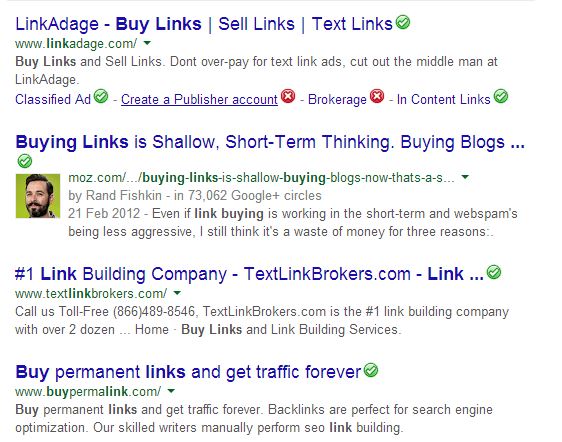With so much being written these days about what Google does and doesn’t like and what the most important ranking factors are it is interesting to reflect on how we got to this situation.
When webmasters discovered that the number of links that pointed to your site had a direct relationship to how you ranked on Google the floodgates opened. Pandora’s Box had been opened and billions of websites were set up with no purpose other than to create a network of backlinks.
These networks became paid options and in no time a whole new industry grew up around buying links to improve search engine ranking positions.
Despite Google’s efforts in the past few years and an increasing grip of the Penguin updates, the issue of links still hangs over the whole world of SEO.
Links are supposed to be votes of confidence in your website. They are supposed to be given freely and they are supposed to be natural. Couple this with great on page content and you should be onto a winner.
Sadly this isn’t the case.
Far too often we see sites outranking our clients where the only thing going for them is the quantity of backlinks they have, not the quality.
So why, when everyone knows that buying links is a bad thing, are there still firms out here selling them and people out there buying them?
A search today for ‘buy links’ show the following result;

Sandwiched in between ads for people selling links is an article from the great Rand Fishkin at Moz entitled ‘Buying Links is shallow, short term thinking’ from February 2012.
I couldn’t put it any clearer myself.
So back to the question; why does this industry still thrive and survive?
Recently we were approached by a client who wanted to engage our services but within this were some clear performance metrics based on customer acquisition. Normally we don’t have a problem with measuring performance however in this case the results needed to be achieved within three months otherwise a penalty clause could be invoked. This is not an untypical client request and it easy to see why.
Clients do not have endless pots of cash to throw at ephemeral ‘digital’ work and they naturally want to see an ROI. Results are often driven at board level and particularly in larger companies results are measured in timeframes of no longer than a quarter. The City’s quarterly reporting schedule has a lot to do with this but the problem is that it drives short term focus on results instead of long term strategic thinking.
Let’s be clear; three months is not long enough for SEO to work. In most cases work we do takes at least six months to show clear benefits and the long term benefits last for years. This is why we rebranded last year from SEO to Digital, as the job is about digital marketing and not about short term keyword position gains.
The only way anyone is going to get traction within three months is by employing some ‘black hat’ tactics, or at the very least ‘grey hat’. As a client, by insisting on results in such a short timeframe you are asking for your agency to cut corners. You are driving performance but you are sanctioning work which, if you could see what it is doing and the long term damage it brings to your website, you would never agree to it.
In the next week we will be launching a new service and a website aimed at people who have been hit by Google and need links removing from their backlink profile. With over ten years of awful link building there is a massive amount of clean-up work to be done and having done this for clients before and achieved good results we know how to do the job.
The sad part is that there is no need for this. Google allowed this to happen and they are now responsible for driving the need for this type of work. But more than that, companies themselves are driving the need for this type of work by insisting on unachievable performance timeframes.
So if you are looking to engage an agency any time soon, think carefully about what you are asking them to do, or you could find that you are engaging them to simply build tomorrows problems into your website today.



